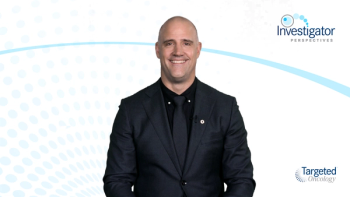
Ibrutinib Clinical Trials for B-Cell Lymphomas
Drs Shadman and Cohen provide an overview of clinical trials utilizing the BTK inhibitor, ibrutinib, for B-cell lymphomas.
Episodes in this series

Mazyar Shadman, MD, MPH: Starting with CML [chronic myeloid leukemia], which is the most common leukemia in the Western world, the treatment landscape mainly included chemoimmunotherapy. When ibrutinib became available in the previously treated population and later in the head-to-head RESONATE-2 trial comparing ibrutinib with chlorambucil, we started having access to this great drug for patients with CLL [chronic lymphocytic inhibitors]. It took us awhile to have head-to-head randomized trials in the first-line setting to show that ibrutinib is superior to our maybe stronger chemoimmunotherapy regimens, like FCR [fludarabine, cyclophosphamide, rituximab] and bendamustine-rituximab. The Intergroup, ECOG, and ALLIANCE studies later showed us that ibrutinib in combination with rituximab was superior to FCR [fludarabine, cyclophosphamide, rituximab] with overall survival benefit in overall population. In a lesser frontline study, the ALLIANCE study, we saw that ibrutinib with or without rituximab was superior to bendamustine-rituximab from the PFS [progression-free survival] standpoint. That showed that ibrutinib could be used as a standard treatment in both the first-line and relapsed settings.
Before that, we had information from different studies showing that in patients with del17p in CLL, where chemotherapy does not have any role, we saw improved efficacy and longer remissions with ibrutinib. Very soon that drug become standard of care for patients with a normal TP53 deletion or mutation. Same thing with mantle cell lymphoma. You did mention some other histologies, like Waldenström [macroglobulinemia] and marginal zone. Ibrutinib also has a label for chronic GVHD [graft-vs-host disease] in patients who receive allogeneic stem cell transplant and is 1 of the few FDA-approved drugs in that setting. The drug became widely available and very effective, but for those of us who use this drug often—most of our colleagues in the community are similar with ibrutinib—the efficacy may not have been a major issue. But we all have to deal with some adverse events [AEs] that patients are going through.
In your practice, what’s the most common adverse effect that your patients report or experience? Are you thinking about switching therapy or making adjustments to their dosing?
Jonathon Cohen, MD, MS: You bring up a good point. If we think back to where we were 10 years ago for relapsed mantle cell [lymphoma] as an example, it’s remarkable what a difference ibrutinib has made in the lives of a number of patients. But because it’s given daily indefinitely, we’ve identified a number of toxicities that emerged early on in the therapy but that can sometimes be persistent. In my practice, the things I worry about the most are the bleeding complications and some of the arrhythmias that can develop for patients on ibrutinib. Atrial fibrillation, for example, is a well-described cardiac toxicity that can be managed in many cases; in some instances, patients can stay on therapy. But for a patient who may then require anticoagulation and may have other comorbidities or some physical limitation, that becomes a concern if you’re worried about fall or something along those lines.
As far as some of the more common milder toxicities that can become difficult for patients, many patients develop arthralgias—which may be low grade but over months can be quite annoying—and fatigue. I’ve had a number of patients who have not been able to tolerate ibrutinib because of continued fatigue. One of the things for me that has been interesting to see over the years is that when ibrutinib was developed, there seemed to be a reluctance to reduce the dose. It was felt that patients needed to be on full dose to have maximum benefit and that dose reductions weren’t necessarily effective. But at least in my own practice I’ve been able to successfully reduce the dose for some patients, especially somebody who may be in remission and doing well and has been able to stay on therapy.
Is that something that you’ve employed in your own practice, or do you typically stick with the full dose or go to a different agent if they can’t tolerate it?
Mazyar Shadman, MD, MPH: Very good point. To me it depends on the type of toxicity that the patient experiences. With major bleeding, you probably want to stay away from the family of BTK [Bruton tyrosine kinase] inhibitors if possible if there is an alternative option which unfortunately we don’t always have that luxury of having other effective and reliable drugs. But if we do, that may be a situation in which I try to use a different drug. For less severe or less significant AEs, I would say absolutely dose reduction. For CLL, for example, dropping from 420 to 280 mg, we know that the efficacy isn’t compromised in most patients. Absolutely, dose adjustments are done. A good percentage of patients continue to benefit from the drug, and the AEs become less of a problem or resolve. But these decisions are dependent on the alternative options available and the severity of the AE.
This transcript has been edited for clarity.









































